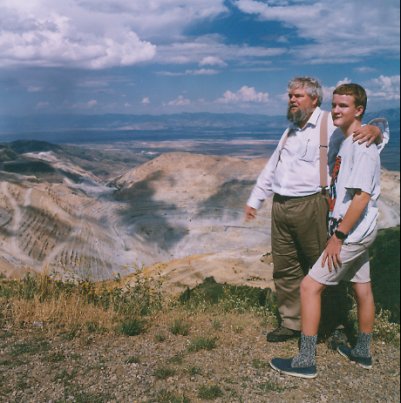
Bingham Copper Pit is huge and dominates the landscape on the west side of Salt Lake valley. (I can't remember when this was taken, middle or late 90's)



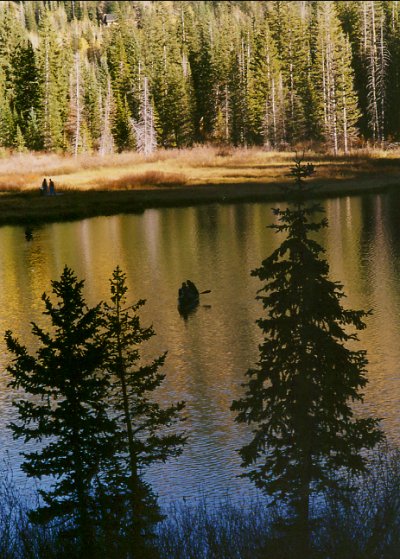

|
Volume 1: The early years 1948-1966 Volume 2: College, Army, first jobs 1966-1977
|
Volume 3: PC Revolutionary: Computerland, Beehive, Novell 1977-1989 Volume 4: Beginning The Great Panic: Divorce, bankruptcy, mid-life crisis 1990-1993
|
Volume 5: Being a Sea Cucumber 1994-1997 Volume 6: Searching for a new life, 1997-2002 (and discovering how deep the Panic Scars are)
|
|
Volume 7: Recovering from Panic Thinking 2003-2008 |
Volume 8: Remaking a home in the USA 2008-2010 |
Volume 9: Searching for positive feedback 2011- |
Volume 6: Searching for a new life, the post-windfall legacy 1997-2002
 |
I took the kids to see Bingham Copper Pit from the top, and while we were
up there, we shot this picture of Roger and me.
Bingham Copper Pit is huge and dominates the landscape on the west side of Salt Lake valley. (I can't remember when this was taken, middle or late 90's) |
 |
This was a time when I got back into my photography as a hobby, and I shot a lot of pictures that were simply... interesting. This was taken at Cascade Springs, east of Mount Timpanogus, southeast of Salt Lake City. |
 |
These are shot in the mountains of the Wasatch front... generally east of Salt Lake City. This one is in East Canyon, northeast of Salt Lake City. |
 |
This one is in Alpine Loop, southeast of Salt Lake City. |
 |
This is Brighton Lake, due east of Salt Lake City. |
 |
And this was in Dixie National Forest a four hour drive south of Salt Lake City. |
Editorial:
To this day I'm profoundly upset with the Child Support process and the Bankruptcy process. Both failed at a part of their mission that is profoundly important the community, and to their reason for existing: that part was getting me back into the community as a productive member.
This was a "quiet" failure for them: it didn't show up in any newspaper headline or any accountability report, but it was a very expensive failure. For eight years I did not have a $40,000/year job in Utah.
8 years x $40K/year = $320,000 of personal income expensive, and approximately $100,000 in total taxes expensive.
We should restructure these processes to make this kind of failure something they are accountable for as well. If they are held accountable, they will find ways to minimize the damage. If they are not held accountable, they will never bother to. The first step in solving this problem is to change the image of the "bad guy" from the "Deadbeat Dad" into something else.
|
When I confronted my longtime financial nemesis in 1997, I had a new tool at my disposal: I could once again file bankruptcy. Doing so could wipe out the student loans and, I thought, the IRS debt. I contacted all those who had a claim on me; pointed this out, and gave them another chance to work with me.
Because of the intransigence of the Utah State Tax people, I filed bankruptcy a second time. (My God! It's still hard to believe!) So, in the end, after seven years of unproductive purgatory:
*(Because of a glitch in how the money was sent to Sue, she paid back all but $1,000 of what I paid the ORS. I pushed her only mildly for the final $1,000 because I felt having her owe me that money was good leverage whenever the ORS contacted me asking for some capricious payment -- which they did a couple times. When they did my first question was, "When are you going to help me get back the $1,000 that Sue still owes me, on agreement that you are party to?" This -- plus my always-on-time payments once this new agreement had been reached -- proved enough to derail caseworkers whenever they thought up some new petty policy to harass me with.)
So... you tell me. Who won anything out of this whole eight year long fiasco? I know who lost a lot: me, Sue, the kids, the Utah community and the US community. To this day it sickens me to see how rotten this whole affair came out. We need a new image to work at for solving post marital and post bankruptcy phenomena. The Deadbeat Dad image is proving hugely expensive to the community.
But, rotten as the solution turned out to be, in 1997 the vestiges of the Sue Catastrophe were erased at last! -- the financial ones, that is. The scars to my career and my thinking processes lasted years longer.
It was late in 1997, and I was in the US, and once again, it was time to look for work. And, joyously, this time I could look in the US. I could finally take a $30K/year "regular job" in the US, and save some money. I hustled for work in the Salt Lake area in the old fashioned way, and found it as hard to find as always.
I finally landed a job as a trainer with CompUSA, which was just opening a store in the Salt Lake Valley area.
CompUSA was a big company, and a rising star in computer retailing in the late 1990's. They had over a hundred stores open, and were opening more at a furious pace. A professional store opening team came in to train us new hires how to open the store -- the first in Utah. They were slick, and it quickly became clear that CompUSA had a procedure for everything. Like the Army, the company was set up so that people were interchangeable units, as long as they could follow procedure.
As I worked with the organization, and gained understanding of it, I could see that the endeavors that CompUSA chose to involve itself in were picked with a close eye on stock prices and the business prospectus, rather than on what the people of the company were competent at doing. Retailing computers was the heart of their business, and this they were good at. But they also were involved in direct sales (because they could use the store inventory to support that activity) and training (because training could fatten the margin on the hardware they sold).
The problem with this form of thinking was that they didn't analyze how to do these peripheral activities nearly as well as they did retailing -- their procedures were poorer, and so those aspects of the company didn't work very well.
But... that was a worry for later. In 1998 it was a new store, and there were lots of new things to do; I was happy for the first year. My most memorable teammates in the training area were Jeff Short and Mike Eckels. Mike headed the department, and he was a very sincere guy. Jeff handled sales, and he was great at hustling up new business.
I learned as well as taught. I learned to teach lots of application software. I got up to speed on Word, Power Point, Access, 1-2-3, Corel Draw, Front Page, and a few more I can't remember now. It was stimulating. The classes were one- to three-days long. Most were taught in the CompUSA training center, but some we taught on-site. When we did that Jeff and I would hustle equipment to-and-from the site.
But, these applications packages I was learning and teaching were considered "lightweights" in the training world -- anyone could teach them, and the profit margins were low. The CompUSA management wanted to migrate into teaching Microsoft and Novell networking and Cisco routers. These were higher margin training items. (the fact that these courses had little to do with selling personal computers -- the company's core -- was ignored.)
I could see the opportunity knocking, so I leaned into my past strengths and once again updated my certifications. Throughout 1997 and 1998 I continued to take Novell courses, and I took Microsoft courses as well. By late 1998 I had an arm-long list of certifications:
I was loaded for bear! Unfortunately, the bear never came! Once again, as with my MBA, I found no new doors opening. These formal qualifications did not do what they were supposed to do: open doors and make my life better. In the case of the MBA I don't feel I wasted my time. Doors may not have opened, but I learned the basics of pontificating as I earned that degree, and that was fun and fulfilling. In the case of these technical certifications, I feel I did waste my time. I was already aware that I wasn't having fun with the technology anymore, and when the doors didn't open, I got nothing for my effort.
In 1998 Mike left CompUSA to join the FBI, and "the sharks" took over the training department. The first of these was a fellow who had earlier been promised a management position at the store, and Mike's departure opened up the head of training position. Using the presumption that anyone can fill a position if they can follow the procedure, he was eminently qualified.
One of this first moves was to invite me to change from CompUSA employee to CompUSA contractor.
"You're overqualified for the lead teacher position you are currently occupying." he told me soon after becoming Training Manager, "That's a position for someone who's going to be setting up classrooms, and that's the kind of person I'm going to fill the position with."
At that point, I set up RBW Consulting. I contracted with the CompUSA Training Department to teach some networking courses, but it was clear to me from Day One how tenuous that income source would be, so I started looking for other business, too.
Epilog to CompUSA:The manager positions at CompUSA were not as interchangeable as CompUSA leadership had planned they would be. This replacement manager, and his replacement, were good examples. They came in, they tried to "get with the program" as the CompUSA procedures manual had outlined it for them, they couldn't meet goals and got cynical, they were moved elsewhere. In 2000 CompUSA imploded financially, changed ownership, and changed its business plan radically. The Direct Sales departments were centralized in Texas, the Training Departments withered, and the retail product mix became more general purpose consumer electronics rather than PC-centric. |
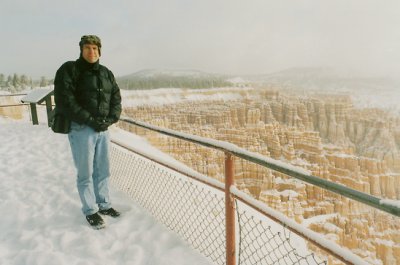 |
To get these interesting pictures, I started traveling to photogenic
sites at odd times. Someone who often traveled with me to these places
was Martin "Marty" Prier. He too loved shooting pictures of
odd places at odd times.
Here were are visiting Bryce Canyon in southern Utah in the dead of winter. This was an interesting place to visit around Christmas time. |
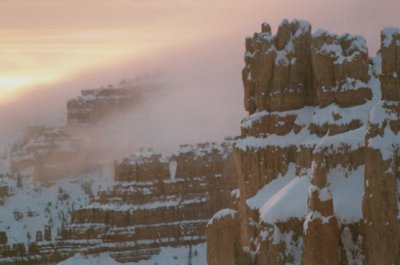 |
Bryce Canyon at dawn, in the fog. This was one of those times when you just didn't know what would come out. I came in pick dark, all alone, set up cameras on tripods... and hoped. This time I was richly rewarded! |
 |
Some Bryce Canyon trees. |
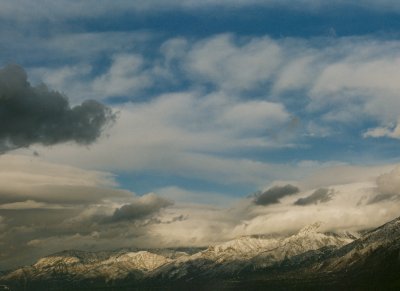 |
This was a "heads up" shot rather than a difficult one.
I knew I wanted some interesting cloud pictures, and I happened to be driving on I-15 at "point of the mountain" when these appeared as a storm was leaving the Salt Lake valley. I pulled over and took the shot. |
 |
Even just a hunk of boring, straight road can become interesting... if the clouds are right. This is I-15 north of Grantsville Utah, on the way to Wendover, NV. |
 |
A new home in Utah Valley. This is a view! |
Ever since my Computerland Days in the late seventies, I've known how easy it is to start up a business entity, and so I did so as I left CompUSA. This time I made the name real simple, and I didn't bother to incorporate. I didn't bother to incorporate because I had nothing to risk. I had nothing, so I had nothing to loose should someone come after me legally. Should I get something in the future, I would then incorporate.
I found myself in a situation similar to what I had been in at NTS/Techvoice: I was an Information Technology expert trying to find people who needed my services. The biggest difference was I now had an armful of certifications, a web site of my own (White World) and I was emphasizing my training talents rather than my writing or researching talents.
I signed up with the Training Associates, a training brokerage operating out of Massachusetts who did a lot of Netware- and Microsoft-oriented brokering. They were trying to expand their West Coast presence, and they found me an assignment every couple months. My business plan called for me to be training about every other week, so the volume they produced was far short of what I needed. In addition, I discovered, they were constantly in search of people to teach the newest, hottest software, but they didn't come up with many opportunities to teach older software. A typical request was for teachers of Windows 2000 software early in 1999. The product was barely out of alpha, a year from commercial release at least, and they had training organizations that wanted to start teaching it!
To be specific about the problems with teaching "alpha software": the product is unstable (it crashes while you were trying to run it) and it is highly mutable (the product's features change from week to week). And yet the training schools were screaming to teach this? Insane!!... and not my style. I want to teach things I know well.
Unfortunately, that kind of request turned out to be typical of what The Associates offered: if was I going to teach much for them I was going to have to chase the Technology Muse even harder than I had when I was younger. And... frankly... I was getting more and more discouraged about chasing the Muse. I did work for them for about a year, and got unhappier and unhappier.
I now started to view the computer industry as a whore because I was discovering that about 30% of what I learned in mastering the personal computer environment was becoming obsolete every year. I no longer wanted to keep up with that severe a "knowledge hemorrhage"
But, I hustled. In addition to The Associates and CompUSA, I looked for writing work, and I introduced myself to the various technology training companies that were working in the Salt Lake and Provo areas.
I taught for CompUSA, and I taught for some other training companies. But the more I worked with these training companies, the "flakier" they all looked. One company, CTI, folded shortly after I taught a Novell class for them. I was very lucky. I got my money out of their last wave of refinancing, but the students -- who had invested up to $20,000 for a couple year long series of courses -- got nothing. The guy running the place turned out to have been a crook before he started the school, and apparently he hadn't changed. The school was a ponzi-scheme variant where he took the student's money up front, and made the place look nice, but he left no money for actually getting the training done. Apparently he hoped to sell out to a bigger company before that harsh reality came to roost, but it didn't happen.
The longer I worked in the training industry the less I liked it. It was an industry filled with "defectors", and I much preferred the kind of "double cooperator" environment I had experienced when the PC industry was pioneering and when Novell was a startup that was creating a whole new industry.
And this was creating a very deep crisis for me: The crisis was What do I do next?
While I was figuring that out, I spent some more time teaching in Korea. Here's an e-mail diary I kept during that period.
About this time Richard Block, a longtime friend, introduced me to one of the latest concepts in computer gaming: the massively multi-player on-line role playing game. (MMORPG or MMRPG). He did this by getting me involved in the beta testing of a game called Asheron's Call (AC).
Computer games and role-playing games are both great loves of mine, and of my longest and closest friends. We have gamed together since I came to Salt Lake in the mid-seventies. So, for Richard to introduce me to a new game is nothing new.
What was new about Asheron's Call was that it came at this time of deep career crisis for me, and it provided exactly the kind of environment I wanted to live and work in. Specifically:
I quickly found I was devoting a lot of time to playing the game. I built a web site about playing the game -- Doc Feelgood's Cast and Bash Clinic -- and I contributed to other web sites about the game (ACSpedia). And, it filled my thoughts. When I was doing Asheron's Call (AC), I didn't need much else to satisfy me, and it cost only $10 a month (well... at times $30/month, because I would keep three accounts going.)
That was the good news. The bad news was AC gave me an excuse to become seriously sedentary, and I found I was quite content to spend 80-90% of my leisure time just sitting in front of a computer screen and puttering around in my apartment.
Y2K was the last great "non-event" of the twentieth century. Non-events disappear rapidly from the public psyche, so you may not remember the Y2K Crisis, but in it's day it loomed large. The doom-sayers were predicting all sorts of catastrophes caused by the fact that computers would not be able to calculate dates right after 2000 because many used only two digits to indicate years.
They were wrong, but their doom-saying meshed as nicely with 20th century worries as worrying about Christ's coming did with 10th century worries, and in both cases crazy things were done, "just in case."
I rode the mania to get my last employment of the century. I worked as a temporary for a testing company that was certifying Netware software's Y2K compliance. It was a nice job, and I did well enough that my employers sent me to Intel to do some program debugging for them. It lead to a really strange chain: I worked for Manpower, who sent me to ____, who sent me to Intel.
I worked at Intel for about three months, then the chain collapsed. Intel ran out of funding for their project, and they didn't want me anymore. There was no more Y2K work at _______, so they didn't want me anymore. And Manpower never came up with another assignment for me.
Civilization survived to celebrate January 2nd, 2000, and in 2000 I picked up my little piece of the Telecom Boom, too. I picked up a writing assignment to assemble an operating manual for a startup telecom company based in Draper, UT. The highlight of that assignment for me was acquiring a nasty computer virus that wiped out every .JPG picture on my notebook computer, and replaced it with a copy of the virus. I lost over 1,500 files, and it took me a couple days to figure out what the problem was. The only good news was I had back ups for all the important pictures on another computer.
Once again, I did the work satisfactorily, but got nothing further in the way of work from it.
After that assignment, I plunged deep into Asheron's Call. I was just not happy with the work scene, and I was very happy nestled up inside Asheron's Call.
As the money ran out from my Y2K and Telecom Boom work, I gave Kim a call, and got what I wanted: an "appreciation fix." Kim instantly said, "Sure." And as usual, my Korean students were very good about expressing their appreciation at having me as a teacher.
My stay over there was once again different. This time I was still very deeply involved in Asheron's Call, and I remained so while I was over there. So, by day I would teach English, and by night I would immerse myself in playing Asheron's Call, and in reporting what I did and learned while I played on my Doc Feelgood web site.
English teaching was a good way to get exercise because I walked to and from work. And, it was a good way to get money. I needed the work and the exercise and the money. Asheron's Call gave me something I could get very intense about doing when I was not working. I was even a manager in that virtual world: I ran a monarchy in the game.
This time I did not explore Korea much. It was a case of, "Been there, done that." I had been all over Korea already, so there was little new to see. Because I was still not fluent in Korean, there was little in the way of local sports or hobbies I could participate in. But, I didn't want to, anyway. AC was a sufficient "time sink." So, my stay was, superficially, a satisfactory existence.
One thing I did decide while I was over in Korea was I was no longer interested in Netware, Microsoft, or making personal computers work, as sources of income. I decided I was tired of pursuing the Personal Computer Technology Muse. I didn't know what I was going to replace it with, but I wouldn't do Netware- or Microsoft-related PC Technology anymore.
The 9-11 Disaster happened while I was mid-way through this stay in Korea. I first heard about it as I walked into the office that morning, but I didn't have time to digest the information or see pictures of it on TV until after I taught my first class. (this was probably Sept. 12th, local time, because Korea is ahead of the US in world time.) Even though I saw no pictures for more than an hour after I first heard about the trouble, it was clear that this was a "Kennedy Assassination Moment" -- an image that would stay with me for years.
I told my students of that first class, "I'm continuing to teach this class, in spite of the magnitude of the tragedy, because this is the best way I can think of to fight terrorism. The terrorists are doing these terrible things to make us change the way we live. We can fight back the hardest, and most effectively, by conducting business as usual."
This is a sentiment I believe in today as much as when I spoke those words.
After 9-11 happened, I picked up a new hobby: predicting what changes that disaster would make to US history. Years before I had written a Toastmasters speech called Anatomy of a Memorable Disaster. That speech had started me thinking about how people reacted to disasters. When 9-11 happened, I found myself making predictions, and posting them on my White World web site.
Scarily, a lot of what I predicted happened. Scarily, because I predicted a lot of visceral response to 9-11, and not much rational response.
As my tour in Korea was coming to an end, I considered staying longer. If my non-working life was going to be filled with AC, why not stay? I decided not to stay because a life filled only with English teaching and AC sounded pretty sterile. I had to try, once again, to find a life in the US.
The first time I went to Korea I lost a lot of weight, perhaps 50 pounds. The second time I lost a little weight. The third and fourth times I was so acclimated to Korean food that I lost nothing, so I came back as big a man as when I left.
In addition, when I came back the forth time, I found was weaker: my stamina was down, and I was getting stiff. I could hardly sit cross-legged any more, and getting out of low couches was an elaborate task.
I was also weaker in spirit. I had now played Asheron's Call intensively for more than two years -- a long time to play one particular computer game -- but I could find nothing interesting enough to replace it. When I thought about working in the US, I immediately thought, "What the hell am I going to do? I can't find a thing the community is willing to pay me to do for more than a few weeks at a time?"
Asheron's Call was now an addiction, but when I got back to the US I crawled back in to it because I could not, for the life of me, think of anything else I was both capable of doing and wanted to do... except go abroad and teach English.
I also found... I was not the wellspring of ideas I had been ten, even five years before. I reworked my science fiction stories rather than writing new ones.
When I came back I found I had unexpectedly slipped from independent contractor into de facto retired, and this was a foundation-threatening crisis. I had never expected to retire. I had felt there should always be something I could do for my community, and it would be something the community felt was important enough that they would show their gratitude by paying me to do it.
But, here I was doing nothing, and I could figure out nothing to do. My Four Step Plan was in shambles, and with it, my meaning in life. The scars of the divorce and bankruptcy were still vivid. I was still not able to move beyond them... and now I was getting old besides.
The Fall of 2002 was not a pleasant time.
|
Volume 1: The early years 1948-1966 Volume 2: College, Army, first jobs 1966-1977
|
Volume 3: PC Revolutionary: Computerland, Beehive, Novell 1977-1989 Volume 4: Beginning The Great Panic: Divorce, bankruptcy, mid-life crisis 1990-1993
|
Volume 5: Being a Sea Cucumber 1994-1997 Volume 6: Searching for a new life, 1997-2002 (and discovering how deep the Panic Scars are)
|
|
Volume 7: Recovering from Panic Thinking 2003-2008 |
Volume 8: Remaking a home in the USA 2008-2010 |
Volume 9: Searching for positive feedback 2011- |